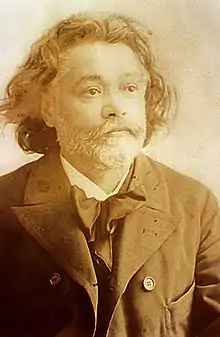Clovis Hugues
Clovis Hugues (November 3, 1851 – June 11, 1907) was a French poet, journalist, dramatist, novelist, and socialist activist. He wrote some of his works in Provençal and un 1898 was elected a majoral of the Félibrige, a society for the promotion of the Occitan language and culture.

| French and Francophone literature |
|---|
| by category |
| History |
| Movements |
| Writers |
|
| Countries and regions |
| Portals |
Life
Born in Ménerbes (Vaucluse) to the family of a miller, he studied for the priesthood in Carpentras, but did not take orders. For some articles favorable to the Paris Commune, published in the local papers of Marseille, he was condemned in 1871 to three years' imprisonment and a fine of 6,000 francs. In 1877 he married the sculptor Jeanne Royannez (1851-1907).[1] In 1877 he fought a duel in which he killed his adversary, a rival journalist.[2]
Elected deputy by Marseille in the general elections of 1881, he was at that time the sole representative of the French Workers' Party in the chambers. He was re-elected in 1885, and in 1893 became one of the deputies for Paris, retaining his seat until 1906. He died in Paris.[2]
His poems, novels and comedies are full of wit and exuberant vitality.[2]
Works
Poetry
- Poèmes de prison (1875), written during his detention
- Soirs de bataille (1883)
- Jours de combat (1883)
- Le Travail (1889)
Novels
- Madame Phaëton (1885)
- Monsieur le gendarme (1891)
Dramas
- Une Étoile (1888)
- Le sommeil de Danton (1888)
References
- "Biographie Jeanne Hugues-Royannez". Nella Buscot. Retrieved 10 November 2018.
- Chisholm 1911.
- This article incorporates text from a publication now in the public domain: Chisholm, Hugh, ed. (1911). "Hugues, Clovis". Encyclopædia Britannica. Vol. 13 (11th ed.). Cambridge University Press. p. 869.
- Jean-Claude Izzo, Clovis Hugues, un rouge du Midi, Éditions Jeanne Laffitte, 1978, 2001.
- Gustave Kahn, Clovis Hugues, H. Fabre, Paris, 1910.
External links
- Works by or about Clovis Hugues at Internet Archive
- Full bibliography
- Illustrated biography (in Provençal).
- Ode au vagin - a 1901 erotic poem by Clovis Hughes
- Clovis Hugues, an 1884 poem by Théodore de Banville